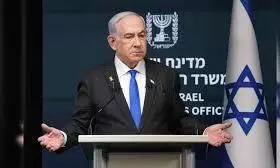
Netanyahu obstinate in rejecting key ceasefire proposal despite pressure
text_fieldsAmid international pressure for a ceasefire in the ongoing Israeli war on Gaza and dialogues being held by stakeholder countries, Israeli Prime Minister Benjamin Netanyahu has become increasingly belligerent, rejecting the proposal that the Israeli army should withdraw from the Philadelphi corridor, thereby further stalling the ceasefire process.
Israeli Prime Minister Benjamin Netanyahu has defied both domestic protests and international criticism by firmly stating that Israel will maintain control over the Philadelphi corridor, a strategic area along the Gaza-Egyptian border.
Netanyahu presented the control of the corridor as a crucial war aim, reinforcing a position that has drawn considerable scrutiny from within Israel and abroad.
Netanyahu’s remarks came in the wake of a weekend of protests in Israel, spurred by the discovery of the bodies of six hostages in Gaza. The protests culminated in a general strike on Monday, reflecting growing public frustration with the government's handling of the ongoing war in Gaza and the efforts to secure the release of the remaining hostages.
The discovery of the hostages’ bodies, including that of Israeli-American Hersh Goldberg-Polin, has intensified calls for a ceasefire deal, which the Israeli government has so far resisted.
Hamas, in turn, has issued stark warnings that any continued military pressure from Israel would result in the return of hostages “inside coffins.” This warning, coupled with the escalating violence, has raised the stakes in the conflict.
The situation has also put pressure on the United States, with President Joe Biden meeting with top advisers to discuss the Gaza conflict. Biden has expressed frustration with Netanyahu’s approach, believing that the Israeli leader is not doing enough to secure a ceasefire. The Biden administration has been working on a proposal for a hostage deal that could potentially pave the way for a ceasefire, but details of this plan remain undisclosed.
Despite this international pressure, Netanyahu has remained steadfast in his position, particularly regarding the Philadelphi corridor. This corridor, which has recently become a focal point of Israeli government policy, was not part of the initial plans discussed with the Biden administration earlier in the conflict. Netanyahu’s insistence on controlling this area is seen as a major roadblock to any potential ceasefire agreement.
The domestic reaction in Israel has been mixed, with significant criticism coming from opposition leaders and various segments of the public. The Hostage Families Forum, representing the families of those still held captive by Hamas, has vowed to continue their protests. However, the protests have so far been unable to exert enough pressure on Netanyahu’s government to change its course.
The Israeli labour court’s decision to end Monday’s strike early further underscored the limited impact of the protests. While the strike, organised by the Histadrut Trade Union Federation, was meant to signal widespread discontent, it ultimately fell short of forcing any significant policy shifts. Many businesses participated in the strike, but it was not the prolonged, impactful event that some activists had hoped for.
As the conflict drags on, the situation in Israel remains tense, with public anger over the handling of the hostage situation still simmering. The Israeli government’s hardline stance, particularly regarding the Philadelphi corridor, continues to be a contentious issue both domestically and internationally. The far-right elements within Netanyahu’s coalition have celebrated recent developments, but the broader political landscape remains fraught with uncertainty.























